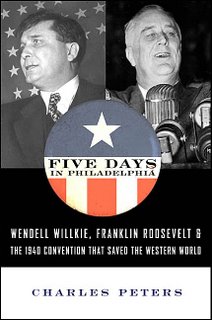
"Five Days in Philadelphia: The Amazing 'We Want Willkie!' Convention of 1940 and How It Freed FDR to Save the Western World" is written by Charles Peters who is the founder and former editor-in-chief of liberal The Washington Monthly. I cast a light on an underappreciated figure in American history, Wendell Willkie.
This is the second book I have read about a specific political race or campaign. The first was James Chace's "1912: Wilson, Roosevelt, Taft and Debs -The Election that Changed the Country". Beyond my general political junkieness, what drew me to this book is that I would like to read Philip Roth’s novel "The Plot Against America" and feel I need to know the real history before venturing into the arena of fiction.
I see many similarities between our time and that of the late 1930’s. And I see uncanny political parallels too.
The Left’s opposition to President Bush and the Iraq War is of a certain kind. That kind of thinking has been around my entire life in the form of their similar opposition to a vigorous waging of the Cold War. But the isolationist Right’s opposition is an unfamiliar circumstance for me. I am aware of the America First movement before World War II but as with anyone looking back, there is a tendency to neglect losing ideologies in history. We tend to see their defeat as inevitable when they usually were actually going concerns in their day.
Peters' thesis is as follows:
Now Wendell Willkie would never be president; but it is arguable that his impact on this country and the world was greater than that of most men who actually held the office. At a crucial moment in history, he stood for the right things at the right time. His nomination as the Republican presidential candidate meant that Roosevelt could get away in an election year with doing what had to be done to keep Britain from falling to Hitler and to prepare this country for the great war it would soon have to fight. Before he died, Willkie said to a friend, "If I could write my own epitaph and I could choose between 'Here lies an unimportant president' or 'Here lies one who contributed to saving freedom at a moment of great peril,' I would prefer the latter."
I need to do more study before I accept his premise entirely. Willkie certainly played a key role in getting the draft and Lend Lease passed. But the margins were so close in each case that many people can make the same claim about their support.
The book is a quick read, only about 195 pages without notes. The author’s style is very readable and he does a good job of taking the reader back to that era.








No comments:
Post a Comment